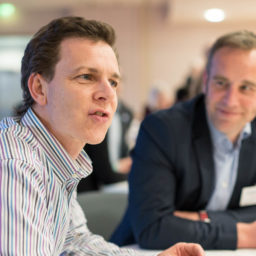
Margaret Heffernan is an entrepreneur, CEO, writer and keynote speaker. She is currently a part-time lecturer at the University of Bath School of Management in England. The voice of leadership | Margaret Heffernan WebsiteMargaret HeffernanWikipediaMargaret HeffernanLinkedinMargaret HeffernanTwitter@M_HeffernanYouTubeMargaret HeffernanGoogleMargaret Heffernan Twitter Tweets by Margaret Heffernan Tags: leadership (68) | Margaret Heffernan (1) | unintended consequences (11) … Continue reading Margaret Heffernan Author, mentor, teacher

Abstract Although innovation is one of the most commonly mentioned concepts in social science unintended undesirable consequences of innovation are rarely studied. This study does a literature review of all articles in the EBSCO database, with innovation in the title and which study undesirable consequences. We found only 26 such articles; 1 per 1000, a … Continue reading Unintended and Undesirable Consequences of Innovation Karl-Erik Sveiby, Pernilla Gripenberg, Beata Segercrantz, Andreas Eriksson, Alexander Aminoff (2009)

Gurteen Knowledge Blog February 13, 2021, 18:55When reading business articles and marketing material, I have a problem with words like maximize, minimize, and optimize. In a complex world: How do you maximize the return on investment? How do you minimize staff turnover? How do you optimize team performance? How do you ever know if you’ve maximized, … Continue reading In a Complex World How Do You Minimize, Maximize or Optimize Anything? You can’t!

Once upon a time, there was a Chinese farmer whose horse ran away. That evening, all of his neighbors came around to commiserate. They said, “We are so sorry to hear your horse has run away. This is most unfortunate.” The farmer said, “Maybe.” The next day the horse came back bringing seven wild horses … Continue reading The Story of the Chinese Farmer Alan Watts

Unintended consequences get to the heart of why you never really understand an adaptive problem until you have solved it. Problems morph and “solutions” often point to deeper problems. In social life, as in nature, we are walking on a trampoline. Every inroad reconfigures the environment we tread on. Credit: The Power of Positive Deviance … Continue reading We Are Walking on a Trampoline Richard Pascale, Jerry Sternin, Monique Sternin

The world is fast-changing and increasingly more turbulent. The problems and challenges we face are both complex and adaptive and thus more resilient in the face of traditional approaches and ways of working. Posts that link to this post What Makes a Real Community? Members of a community care about each other A Slight Modification to VUCA … Continue reading Introduction: Complexity The world is fast-changing and increasingly more turbulent

Navigating challenges is crucial, but the type of challenge matters greatly. There are two categories: technical challenges with known solutions and complex adaptive challenges that are messy, ambiguous, evolving, and require flexibility. Recognizing the distinction is essential for effective responses and meaningful outcomes. In navigating challenges, it is essential to distinguish between two main types: … Continue reading Technical Challenges and Complex Adaptive Challenges Distinguishing between straightforward and complex challenges

We have entered a new world that is increasingly dynamic and hyperconnected. This has massive consequences for us. Connectedness In the last 75 years, with the rapid advance of technology, the advent of cheap global transportation, and, more recently, the birth of the Internet and the world wide web, the world has become more connected. … Continue reading Our World Is Hyperconnected The world is an increasingly connected place

In Plato’s Phaedrus, Socrates shares the myth of Thamus and Theuth, questioning the invention of writing. Writing, he argues, weakens memory and offers the appearance of wisdom without true understanding. Socrates suggests that serious discourse using the dialectic method is a nobler pursuit, leading to genuine wisdom and happiness. Introduction When we think about humankind’s … Continue reading The Myth of Thamus and Theuth Does writing allow the pretense of understanding, rather than true understanding?

Personal change is inevitable We all change over time. The older we get, the more we are aware of how much we have changed. We change gradually in response to many factors: what we are exposed to and how we react to it. In short, our experiences in life. Some of those changes are down … Continue reading Changing People ** What right do we have to try to change someone?

Unintended consequences are outcomes of an action that are not intended or foreseen. Most such consequences are undesirable. However, it is far too easy in business and international development to be armchair philosophers. We often think that the world’s problems are simple and that we have the answers. There are always unintended consequences (sometimes called … Continue reading Unintended Consequences In a complex system, every purposeful action produces unintended consequences









